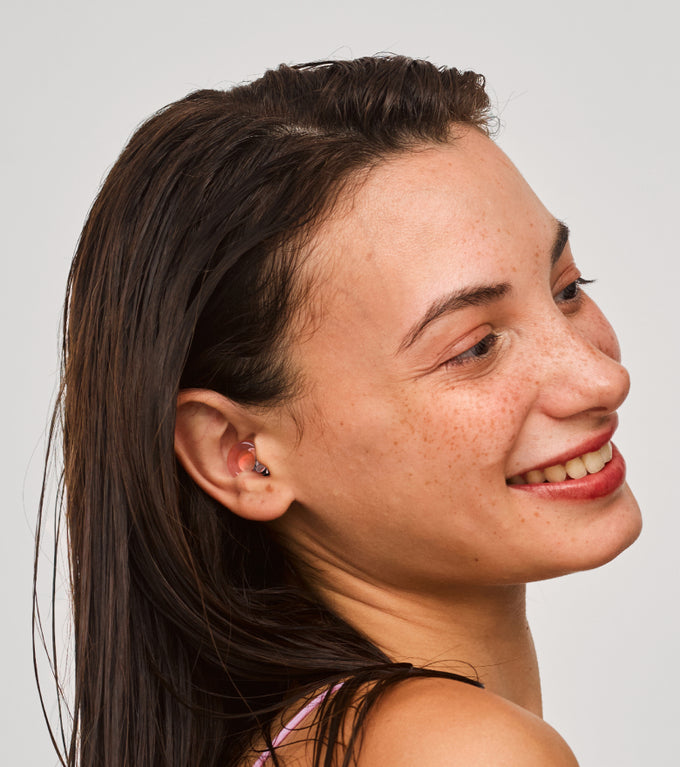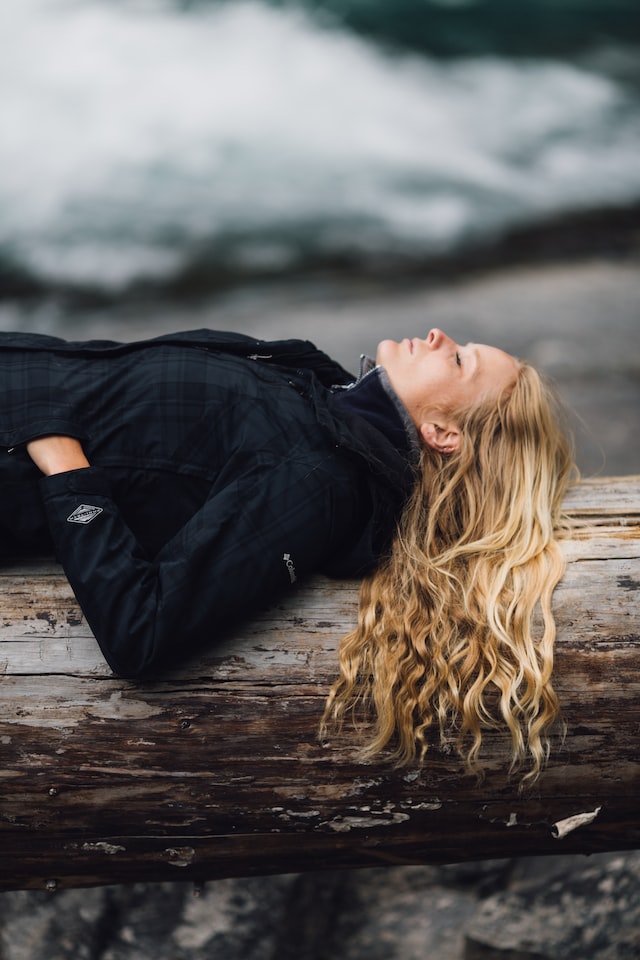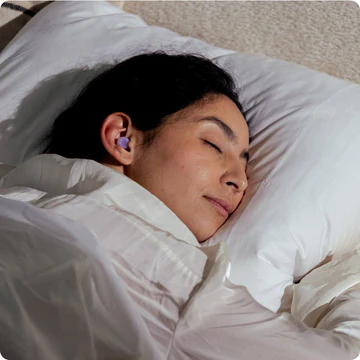Key takeaways:
- It can be difficult to fall asleep while traveling, no matter whether you’re going by plane, bus, car or train
- Being prepared with spare layers so you can better regulate your temperature and a blanket to stay cosy will help to create a more comfortable environment
- Make sure you stay well-hydrated and eat healthily – as it can be tempting to reach for sugar and caffeine when traveling, which will only keep you awake for longer
- Sleep aids like an eye mask and earplugs are helpful for reducing the noise, blocking out light and creating an optimal sleep environment
Hands up if you love to travel!
Us too.
Whether it’s a road trip with friends, camping with the family, or flying overseas to your next bucket-list destination, traveling is always super exciting.
But travel and sleep don’t always mix. And trying to get comfortable enough to drop off on the plane or in the car can seem like an impossible mountain to climb.
And the last thing you want is for no sleep to ruin your adventure and make you feel even more exhausted after traveling.
So we’ve put together some top tips for better sleep when you’re traveling. With these sleeping tips, you can make sure you get enough shut-eye during your travels – so you can enjoy your trip to the max when you arrive, without feeling sluggish or worrying about catching up on rest.
You’re welcome.
Comfort is key
While it may sound obvious, making yourself as comfortable as possible will work wonders when trying to get to sleep on a road trip or flight.
With this in mind, a little bit of forward planning is a wise move to ensure you’re as comfortable as possible, no matter how you’re traveling, or what the temperature is. Think about things like:
- A light-blocking eye mask
Light is also known to delay your sleep, so if you’re trying to get your head down, it’s a good idea to bring things with you that will block out light. A light-blocking eye mask is great, but if you find yourself without one, you should aim to dim the lights whenever possible in the vehicle you’re in. Or, if you’re really stuck, pop a sweatshirt or blanket over your eyes to try to block out some of the light.
- A travel pillow
Finding the best position to sleep on a plane is tough. Mainly because our bodies aren’t designed to sleep upright.
So think about investing in a travel pillow, or even bringing one from home. It’s one of the best sleep aids for travels, as making sure that your head and the natural S-curve of your spine are supported can improve comfort and reduce back pain on long journeys.
Choose the right clothing and layers
Make sure that you’re wearing comfortable clothes – both to help you to get to sleep, and for general comfort. Wear loose-fitting clothing that you can move about in – and remember to take some extra layers in case it gets cold.
Think loose-fitting joggers or floaty linen trousers on the bottom, and a simple t-shirt with a sweater or hoodie to stay cozy. Or, if you’re traveling on a long-haul flight, there’s no shame in rocking up in a pair of pajamas. Comfort is king, after all!

Make use of cozy accessories
If you’re too cold, you’ll find it difficult to get to sleep. So, bringing cozy layers is important – especially on long flights when you don’t have control over the temperature.
Some airlines provide blankets for long-haul flights, but not all do. Be sure to check before you fly and if in doubt, bring your own blanket.
It’s also a good idea to bring a pair of cozy, comfy socks like bed or flight socks to keep your feet warm. If your feet are warm, the rest of your body is more likely to be warm too – and a study in the Journal of Physiological Anthropology even found that feet-warming socks led to 7.6% higher sleep efficiency.
Dealing with noise and the use of noise reduction earplugs
You may not always realize it, but airplanes are super loud – and we don’t just mean during take-off and landing. Whether it’s children crying, noisy air-con, or simply the sounds of a noisy engine (a cruising plane emits 85 decibels), it’s not a huge surprise that sleeping on a plane is difficult.
One of the best ways to sleep in a plane is to use comfortable noise-reducing earplugs for traveling that reduce noise levels to help you get a better sleep – without blocking out the important things that you need to hear, like announcements (or the person sitting beside you when they need to get out to the bathroom).
They even help with relieving irritating ear pain during take-off and landing by equalizing the pressure against your ear drum. And when you drift off to sleep, they’re super safe and comfortable to keep wearing.
Loop Dream™ earplugs are specifically designed for sleep comfort – so you can enjoy your dreamiest sleep ever, wherever you are. They’re made with our softest silicone and an innovative earplug body that reduces pressure on your ears – even if you sleep on your side. The new hybrid memory foam and silicone ear tips follow the natural shape of your ear for added comfort, and they offer 27 dB (SNR) of our most powerful noise reduction to help reduce the impact of those loud plane noises.
Power down your electronics
We’ve all been there. Sleep isn’t coming, and it’s tempting to reach for the tablet or phone to fill the time.
But try to resist. If your body is craving much-needed sleep, it’s probably a bad move. Why? Science has the answer.
Your biological clock follows a 24-hour sleep-wake cycle. This means that when the sun rises in the morning, your body cleverly produces the hormone cortisol, designed to get you feeling awake and ready for the day. As nighttime draws in, another hormone comes into play, called melatonin, which makes you feel sleepy.
So it goes without saying that watching electronic backlit devices during what should be sleeping hours is not going to help you wind down and get good-quality sleep.

Keep your stress levels low
Planning trips can be stressful. Have I packed all I need? What if I can’t sleep on vacation? Bet I’ll forget my passport!
Stop, take a breather, and leave your stress at the door.
There are some things you can do to reduce stress levels, even when you’re on the move. One of the best things you can do is mindfulness meditation. Mindful breathing can have a huge effect on reducing insomnia and encourage an overall better sleep.
Sit comfortably (as far as possible – it’s sometimes easier said than done when you’re in the middle seat of a plane or squashed in the backseat of a car!), and close your eyes. Focus on your breath, inhaling and exhaling naturally. Be aware of each breath, and the rise and fall of your chest – and when thoughts arise, acknowledge without judgment, then gently bring your focus back to your breath. Notice the sensations and sounds all around you, without getting attached to them.
Start with a short session of just a couple of minutes, if you’re not used to this practice. Meditating in this way can help to reduce stress, enhance overall wellbeing, and make you feel more relaxed (and ready to drift off to sleep).
Focus on hydration and nutrition
Staying hydrated while traveling is super important. Airplane cabins, for example, have low humidity which can contribute to fluid loss, while if you’re driving, dehydration can affect your concentration.
Water works wonders to reduce the risk of dehydration, ward off headaches, and help you to generally feel better during a long day of travel. Drink it before, during, and after your travel – it will help your body to remain resilient during travel and more optimized for sleep.
It’s also important to make sure that you’re eating foods that nourish you. Pack some snacks in your bag so you have easy access to healthy options, making it easier to avoid sugary foods that provide you with short-term energy but shortly after make you feel tired.
Finally, try to limit caffeine and alcohol. Both can be a huge disruptor to sleep. It might seem like a great idea at the time, but the relief will be short and it will result in restless sleep.
Try pink noise for sleep
You might have heard of white noise, but do you know about pink noise? White noise sounds like TV static, and has an equal energy at all frequencies. It’s often used for masking sounds, and for concentration. Pink noise, on the other hand, is deeper and more balanced. The volume intensity of pink noise decreases as the frequency increases – think beach waves, rainfall, or whale sounds.
That means that pink noise may be more useful as a sleep aid than white noise. A study by Front Neurology found that listening to pink noise decreased the time participants took to fall asleep by up to 38% – so it’s worth downloading some pink noise to your phone to listen to while you’re traveling, if you want to fall asleep quicker, and stay asleep for longer.
Move your body
Make an effort to make time to keep your body moving, whether it’s light stretching, a little stroll, or even just keeping your arms and legs moving in your seat. Most forms of travel involve long periods of inactivity, which isn’t good for your body and can throw off your sleep cycle.
Final thoughts
So there you have it. It can be hard to fall asleep when you’re traveling, thanks to uncomfortable seats, loud noises, and long periods of activity – but with these tips and a few sleep aids, you’re sure to drop off to sleep in no time at all. Arm yourself with plenty of water, healthy snacks, an eye mask, and a pair of Loop Dream earplugs and we’re sure you’ll have a restful sleep whether you’re traveling by plane, train or automobile.
Frequently Asked Questions
Why is it harder to sleep well when travelling?
Because travel disrupts your routine and sensory environment. New sounds, unfamiliar beds, and schedule changes keep your brain more alert than usual.
Which types of noise most commonly disturb sleep while travelling?
Intermittent and unpredictable noises are the main issue. Hotel corridors, street traffic, other guests, and transport sounds tend to interrupt sleep more than steady background noise.
Can lack of sleep while travelling affect how you feel during the trip?
Yes, poor sleep directly impacts energy, mood, and focus. Even short trips can feel more exhausting when sleep quality drops for several nights in a row.
Is total silence necessary to sleep better in unfamiliar places?
Not necessarily. Many travellers sleep better by reducing disruptive noise rather than eliminating all sound, which can make sudden noises feel more intrusive.
How can earplugs help when sleeping in hotels or shared accommodation?
Earplugs reduce external noise like voices, doors, or street sounds. This helps your body relax faster and stay asleep longer in unfamiliar environments.
Are earplugs practical for frequent travellers?
Yes, reusable earplugs are easy to carry, lightweight, and don’t rely on power or apps. They offer a simple sleep solution across hotels, hostels, and short stays.
Can earplugs still allow awareness while travelling?
Yes, quality sleep earplugs are designed to reduce disruptive noise without fully isolating you. Important sounds like alarms or announcements remain audible.
What makes earplugs comfortable for long nights away from home?
Comfort comes from soft materials, a low-profile shape, and a secure fit. These features help prevent pressure or irritation, especially when sleeping on your side.
Should earplugs be part of a travel sleep routine?
They work best when combined with consistent sleep cues. Simple habits like limiting late screen time and keeping a familiar bedtime routine can improve results.
Who benefits most from using earplugs while travelling?
Light sleepers, people sensitive to noise, and those sharing rooms benefit the most. Earplugs help create a more controlled sleep environment wherever you are.

Always tired? Get the best earplugs for better sleep
Do you have trouble sleeping? Earplugs might be the answer. Learn how earplugs can help you get a better night’s slee...

How to go to sleep faster
We’ve put together a list of eight tips on how to sleep faster so that you can finally doze off and get some well-ear...

Understanding the effects of sleep apnea on sleep
Sleep apnea can be a potentially serious sleep disorder. Here’s all you need to know about what it is, its causes, an...












